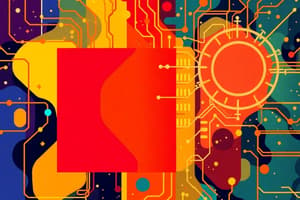Podcast
Questions and Answers
What does Information Technology involve?
What does Information Technology involve?
The use of computers, storage, networking, and other physical devices to create, process, store, secure, and exchange electronic data.
What is digital literacy?
What is digital literacy?
An individual’s ability to find, evaluate, and compose clear information through writing and other media on various digital platforms.
Computer skills are only needed in professional settings.
Computer skills are only needed in professional settings.
False (B)
Why do we need to study information technology?
Why do we need to study information technology?
What is a computer, according to Peter Norton?
What is a computer, according to Peter Norton?
What is the primary function of a computer?
What is the primary function of a computer?
How can computers be categorized?
How can computers be categorized?
What were supercomputers primarily used for?
What were supercomputers primarily used for?
Flashcards are hidden until you start studying
Study Notes
Information Technology
- Encompasses the use of computer systems, storage, networking, and other devices for creating, processing, storing, securing, and exchanging electronic data.
- Focuses on information processing, covering collection, processing, and sharing methods and tools.
Digital Literacy
- Refers to the ability to find, evaluate, and compose clear information using various digital platforms, also known as Computer Literacy.
- Individuals must continuously adapt to technological advancements to remain computer literate.
Importance of Studying Information Technology
- Integral part of daily life, enhancing understanding of hardware and software functionalities.
- Essential computer skills applicable in diverse settings: home, work, school, and leisure.
- Knowing how to use computers fosters self-sufficiency in research, communication, and time management.
Roles of Computers in Daily Life
- Tiny embedded computers are commonplace in devices like alarm clocks, home appliances, and entertainment systems.
- Modern cars depend on embedded computer systems for efficient performance.
- Approximately 10 million people work remotely due to PCs and networking technologies.
- Social media usage for communication outpaces traditional mail and telephone use significantly.
- Daily tasks such as banking and grocery shopping are increasingly reliant on computer technologies.
Growing Need for Digital Literacy
- Demand for digital literacy has surged in a technology-driven world to keep skills modernized and relevant.
- Expanding knowledge is crucial to navigating unfamiliar situations and adapting in a changing work landscape.
Definition and Function of a Computer
- Peter Norton defines a computer as an electronic device that processes data according to pre-set instructions, converting data into useful information.
- Gary Shelly describes it as an electronic device operating under instructions stored in its memory, capable of accepting data, processing it, and storing results.
- A computer can automatically execute a sequence of calculations or operations on data once programmed.
Computer Types and Varieties
- Computers can be categorized based on size, capacity, data handling, operating system capabilities, microprocessors, and user number.
- Focus in this module is on classifying computers by size and capacity.
Supercomputers
- Historically used by large companies prior to cloud computing for substantial computing power requirements.
- Supercomputers possess exceptionally high performance capabilities, suited for complex tasks.
Studying That Suits You
Use AI to generate personalized quizzes and flashcards to suit your learning preferences.




